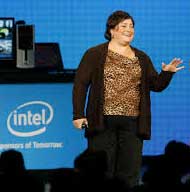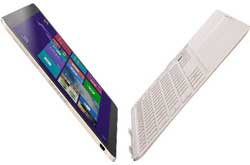Intel backs the long-term survival of PCs

Speaking in Taiwan on the first day of Computex, Asia's largest technology show, new Intel President Renee James said the firm's PC business was going well, but that personal computers would evolve into new forms.
"We do see signs of PC stabilisation globally," added Senior Vice President Kirk Skaugen.
"From both a consumer and a corporate perspective things are better, in some of the areas where we've seen negative growth, like Russia, we're even seeing some recovery there," James said.
Whether personal computers can survive in an increasingly mobile world has been a key question at Computex.
A number of leading companies have introduced new 2-in-1 devices, a cross between a tablet and a laptop, with a detachable keyboard, as a potential replacement for the traditional PC.
"Really these converged-type devices are the new PC," Paul Spain of New Zealand Tech Podcast said at the four-day event in the capital Taipei.
"And maybe one day, in the not too distant future, your phone will be your PC," he said. "You'll have it in your pocket or on your desk and your screen will recognise it. With Intel having processors inside smartphones it's quite possible that will happen," he said.
Desktop demand like to remain

Others argue that consumers will continue to demand a full range of machines for different uses, including desktops.
"There are some things that desktops still offer, such as easy-to-upgrade components and generally lower costs compared with portable machines, especially when it comes to niche uses like gaming and intensive video-editing," Singapore-based technology blogger Alfred Siew said.
"With the evolution of cloud services which share data between multiple devices, having more than one machine is less of a disadvantage," he added.
While Intel voiced optimism for the PC's future, James acknowledged its machines would have to be smaller, thinner and lighter in order to sell.
She unveiled Intel's CoreM processor during a keynote speech at Computex, with designs using the new chip promising both a lightning-fast tablet and a razor-thin laptop.
Products using the CoreM will be available later this year, with the first unveiled by Taiwan's computer maker Asus, the Transformer Book T300 Chi which is a super-slim, high-performance, detachable notebook.
Commentator Spain described the device as a breakthrough, potentially able to handle business tasks and gaming as well as the fun functions of a tablet, something that 2-in-1s have so far been criticised for failing to do.
Intel has been pushing further into mobile devices and the "Internet of Things", which connects devices from cars to household appliances online, as it seeks to diversify from the PC market.
James gave a fleeting glimpse of the firm's future plans at the end of her speech in a video which included a smartwatch, face recognition technology and 3D camera software, saying those offerings would be refined further within the next two years.
Source: AFP via I-Net Bridge

